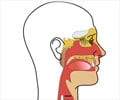The ability of many chronic infections to suppress the immune T-cell response over time is one of the biggest challenges in treating infectious diseases and developing preventive vaccines.
The Emory-led team of scientists reported online this week in the Proceedings of the National Academy of Sciences that they have discovered one important way in which chronic viral infections are able to evade the immune response.Using a mouse model, the scientists found that a chronic strain of lymphocytic choriomeningitis virus (LCMV) targeted a type of stromal cells in the lymphoid organs called fibroblastic reticular cells (FRC). In contrast, an acute strain of the virus had little effect on the FRC cells.
FRC provide a three-dimensional framework used by immune cells to travel and interact with other immune cells within the lymphoid organs (spleen and lymph nodes). These FRC are important for the initiation of immune responses to infections. The researchers found that widespread infection of the FRC caused a disruption of the function of these important stromal cells.
Last year a group of Emory scientists led by Rafi Ahmed, PhD, and graduate student Daniel Barber and their colleagues discovered in mice another way in which the immune reaction to chronic infections is blocked -- a pathway called PD-1 that blocked the response to the chronic strain of LCMV.
The current research was conducted by Scott N. Mueller, PhD, a postdoctoral fellow in the laboratory of Dr. Ahmed, a Georgia Research Alliance Eminent Scholar and director of the Emory Vaccine Center. The team also included scientists from the Emory Transplant Center and Emory School of Medicine, the University of California, San Francisco (UCSF), the University of California, Los Angeles (UCLA), Harvard Medical School and the Dana-Farber Cancer Institute.
The research team discovered that infection of FRC may involve the previously discovered PD-1 pathway. The major ligand (binding molecule) for PD-1, PD-L1, is upregulated on FRC after infection. The PD-1 pathway may inhibit interactions between CD8+ T cells and FRC, preventing destruction of the FRC architecture in the spleen. This may help the virus to remain in infected FRC and contribute to long-term viral persistence.
Advertisement
Source-Eurekalert
JAY/C











